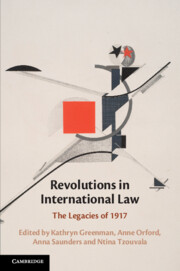Book contents
- Revolutions in International Law
- Revolutions in International Law
- Copyright page
- Contents
- Notes on Contributors
- Acknowledgements
- 1 International Law and Revolution
- Part I Imperialism
- 2 Looking Eastwards
- 3 Lenin at Nuremberg
- Part II Institutions and Orders
- Part III Intervention
- Part IV Investment
- Part V Rights
- Index
3 - Lenin at Nuremberg
Anti-Imperialism and the Juridification of Crimes against Humanity
from Part I - Imperialism
Published online by Cambridge University Press: 21 January 2021
- Revolutions in International Law
- Revolutions in International Law
- Copyright page
- Contents
- Notes on Contributors
- Acknowledgements
- 1 International Law and Revolution
- Part I Imperialism
- 2 Looking Eastwards
- 3 Lenin at Nuremberg
- Part II Institutions and Orders
- Part III Intervention
- Part IV Investment
- Part V Rights
- Index
Summary
The Nuremberg trials stand as a pivotal moment in any history of international law, international humanitarian law, international criminal law and international human rights.1 As Teitel writes, ‘the trials at Nuremberg represented a unique historical crossroads for the three legal orders that form the humanity law framework’.2 By introducing crimes against humanity into international law, the trials are said to have contributed to the creation of a new normative order, aimed at protecting vulnerable humanity.3 For prosecuting individuals for these and other war crimes, they are presented as an example of the rationality and calm procedure of international law overcoming violence, power and the baser instincts of revenge.4
Keywords
- Type
- Chapter
- Information
- Revolutions in International LawThe Legacies of 1917, pp. 56 - 82Publisher: Cambridge University PressPrint publication year: 2021
- 1
- Cited by

